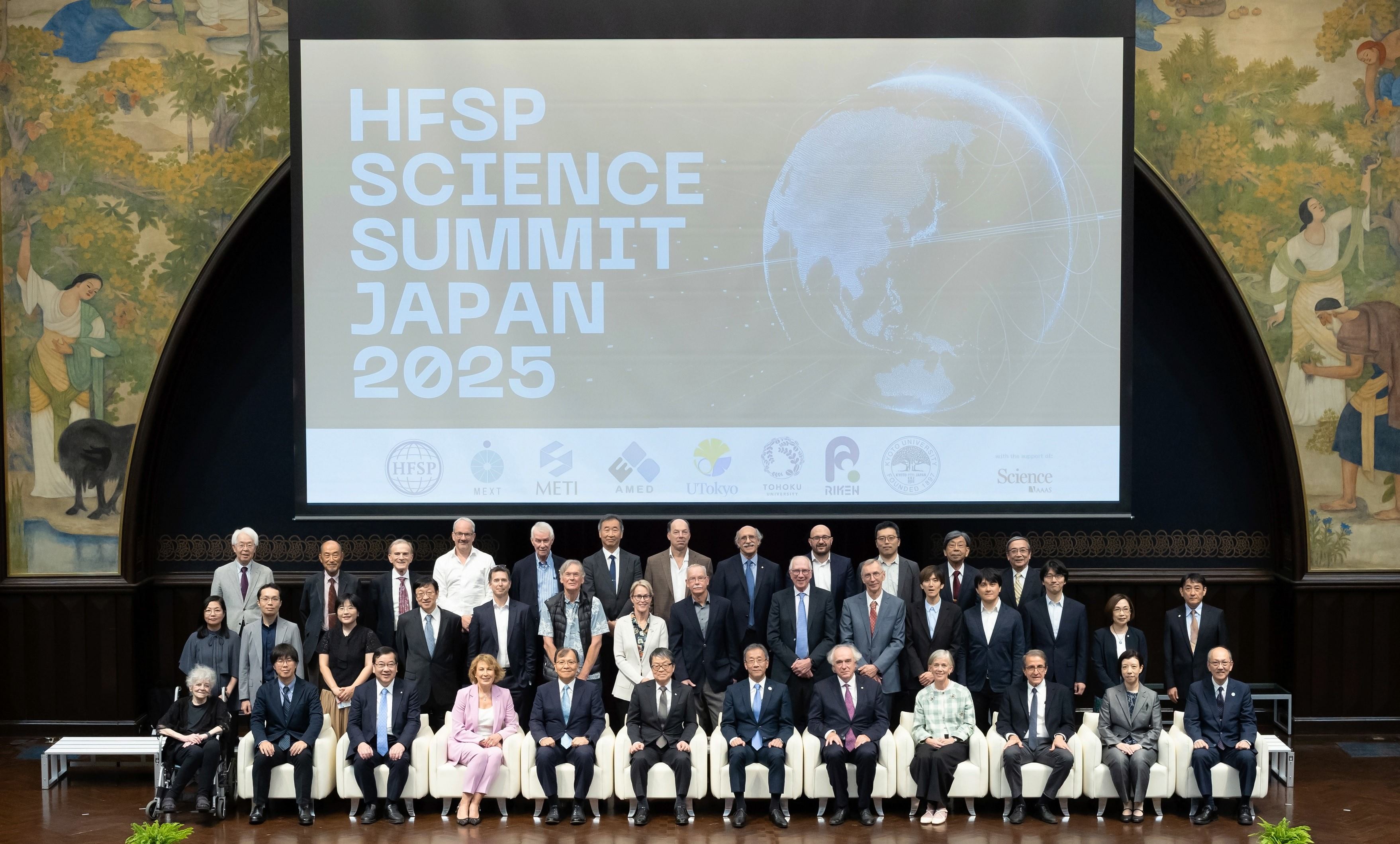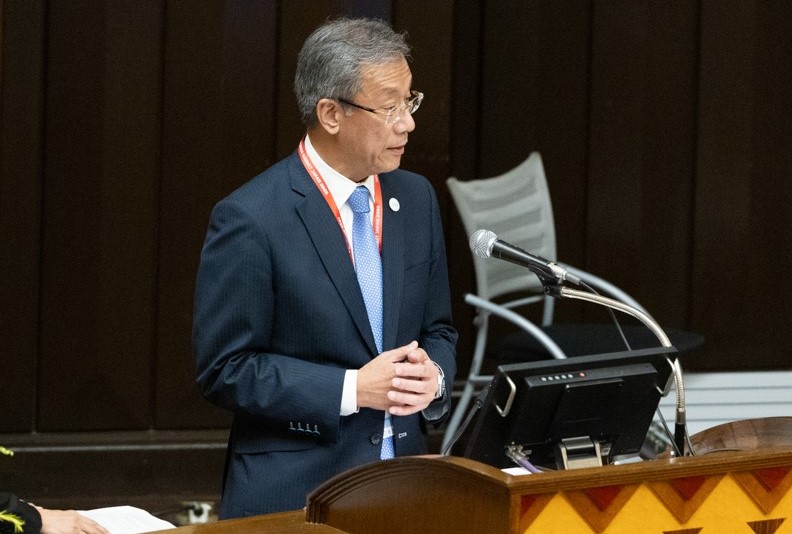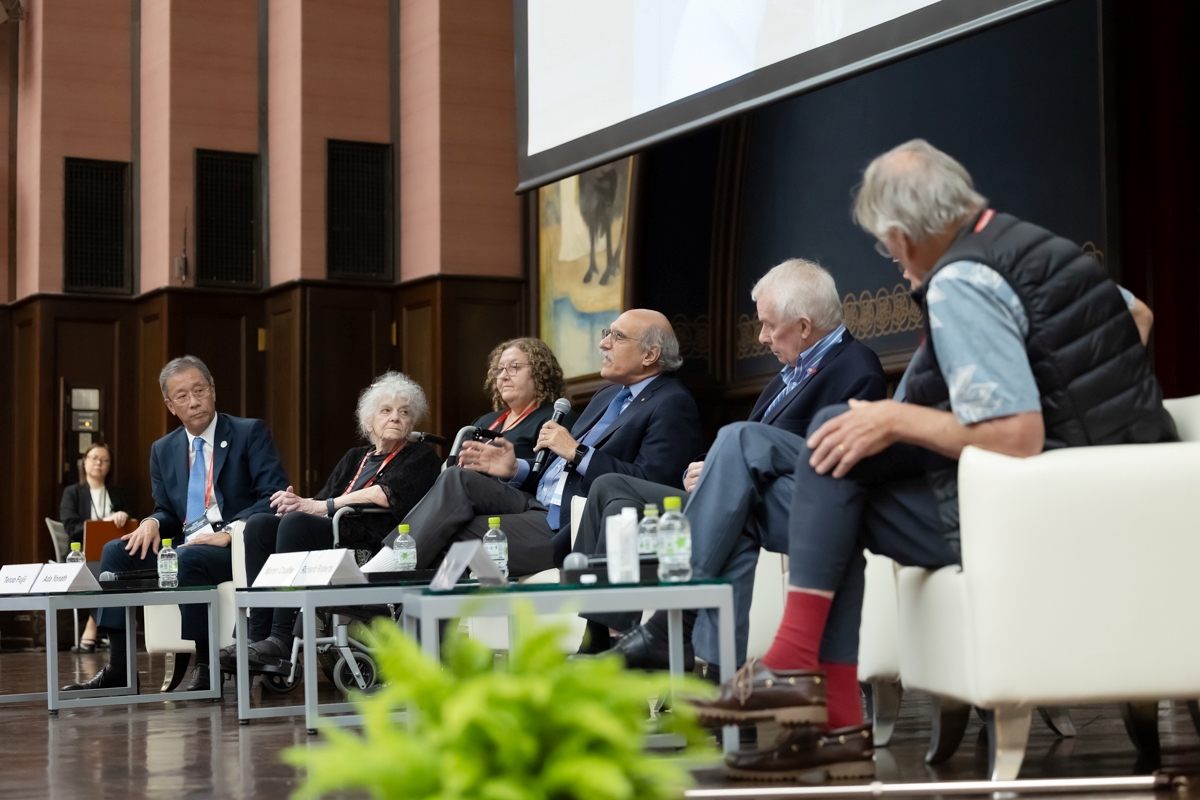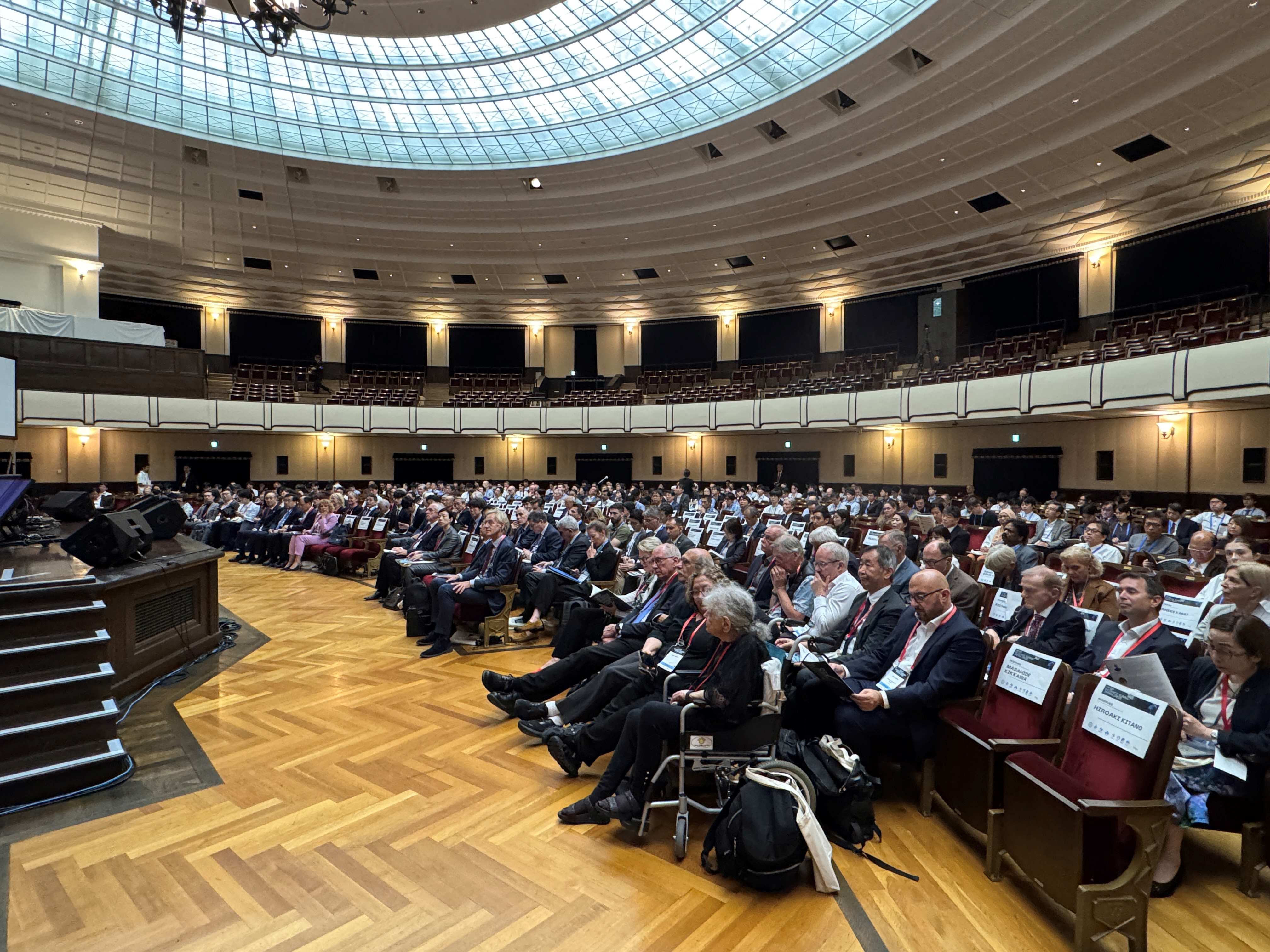High-Level Event of the HFSP Science Summit 2025 held at the University of Tokyo

The High-Level Event of the HFSP Science Summit 2025 was held at the University of Tokyo on Friday, October 3, 2025 in the Yasuda Auditorium on the University of Tokyo’s (UTokyo) Hongo Campus.
This event was held as the central event of the HFSP Science Summit Japan 2025 organized by the International Human Frontier Science Program Organization (HFSPO). In addition to UTokyo, this Science Summit was jointly organized with Tohoku University, RIKEN and Kyoto University between October 1 and 4 with separate satellite events being held at each institution together with HFSPO. In addition to the educational institutions, the Ministry of Education, Culture, Sports, Science, and Technology (MEXT), the Ministry of Economy, Trade and Industry (METI), and the Japan Agency for Medical Research and Development (AMED) also provided support as co-organizers.
Ten Nobel Laureates, HFSP’s Nakasone Award recipients and other top world-class researchers took part in the various sessions of the High-Level Event which consisted of keynote speeches and panel discussions. This event provided a valuable opportunity to learn about the latest breakthroughs in the field of life sciences and gain insights from globally recognized leaders.
The venue, UTokyo’s Yasuda Auditorium, welcomed a diverse audience including government officials from MEXT and METI, distinguished guests from various embassies, current students and researchers, corporate representatives, alumni, international students and general science enthusiasts.
Having so many world-renowned scientists gather in one place is an extremely rare occasion, even in the 100-year history of the Yasuda Auditorium, making it a truly memorable and monumental event.
Programs and Speakers
10:00 – 10:30 Welcome and Opening
KOGA Yuichiro – State Minister of Economy, Trade and Industry (METI)
NAKASONE Hirofumi – House of Councillors, The National Diet of Japan
Angela MCLEAN – Chief Scientific Advisor to the UK Government
Alejandro ADEM – Chair of Governing Board, Global Research Council
FUJII Teruo – President of the University of Tokyo
YONEDA Yoshihiro – HFSPO President and Director General of the Research Foundation for Microbial Diseases of Osaka University (BIKEN Foundation)
10:30 – 11:15 Introduction and Setting the Scene: “In Conversation with Nobel Laureates”
Chair and Moderator: Pavel KABAT – HFSPO Secretary-General
Frances ARNOLD – 2018 Nobel Prize in Chemistry
Thomas CECH – 1989 Nobel Prize in Chemistry
Martin CHALFIE – 2008 Nobel Prize in Chemistry
Tim HUNT – 2001 Nobel Prize in Physiology or Medicine
KAJITA Takaaki – 2015 Nobel Prize in Physics
Paul NURSE – 2001 Noble Prize in Physiology or Medicine
Svante PÄÄBO – 2022 Nobel Prize in Physiology or Medicine & 2018 Nakasone Award
Richard ROBERTS – 1993 Noble Prize in Physiology or Medicine
Randy SCHEKMAN – 2013 Noble Prize in Physiology or Medicine
Ada YONATH – 2009 Nobel Prize in Chemistry
11:15 – 11:45 Japan HFSP Supported Science Highlights
Chair and Moderator: SHIMOGORI Tomomi – Team Director, Molecular Mechanisms of Brain Development, RIKEN
TOJU Hirokazu – Kyoto University
NOZAWA Kayo – Institute of Science Tokyo
KAWAGUCHI Kyogo – RIKEN
SAITO Makoto – RIKEN
KAWAOKA Shinpei – Tohoku University
IKEUCHI Yoshino – The University of Tokyo
11:45 – 14:30 Life Sciences in the 21st Century: A Pathway to Scientific Discovery
Sub-session 1
Chair & Moderator: Angela MCLEAN – Chief Scientific Adviser, UK
Randy SCHEKMAN – 2013 Noble Prize in Physiology or Medicine
Franz-Ulrich HARTL – 2022 HFSP Nakasone Award
Sub-session 2
Chair & Moderator: KIKKAWA Masahide – The University of Tokyo
Paul NURSE – 2001 Nobel Prize in Physiology or Medicine
Rotem SOREK – 2023 HFSP Nakasone Award
Sub-session 3
Chair & Moderator: SUGIMOTO Asako – Tohoku University
KAJITA Takaaki – 2015 Nobel Prize in Physics
Anthony HYMAN – 2021 HFSP Nakasone Award
15:00 – 16:00 Basic High-risk Science as an Engine of Innovation
Stephen QUAKE – 2013 HFSP Nakasone Award Recipient – in conversation with:
KITANO Hiroaki – Chief Technology Fellow, Sony Group Corporation
Jacob HANNA – 2025 HFSP Nakasone Award
Frances ARNOLD – 2018 Noble Prize in Chemistry
Thomas CECH – 1989 Noble Prize in Chemistry
16:00 – 16:50 Closing Session: Life Sciences in the 21st Century – Where will you take us?
Chair & Moderator: FUJII Teruo – The University of Tokyo
Tim HUNT – 2001 Nobel Prize in Physiology or Medicine
Svante PÄÄBO – 2022 Nobel Prize in Physiology or Medicine & 2018 Nakasone Award
Richard ROBERTS – 1993 Nobel Prize in Physiology or Medicine
Martin CHALFIE – 2008 Nobel Prize in Chemistry
Ada YONATH – 2009 Nobel Prize in Chemistry
16:50 – 17:00 Final Words and Appreciation
Chair & Moderator: Pavel KABAT – HFSPO Secretary-General
NAKAGAMA Hitoshi – President, Japan Agency for Medical Research and Development (AMED)
Mona NEMER – Chief Science Adviser, Canada
ABE Toshiko – Minister, Ministry of Education, Culture, Sports, Science and Technology (MEXT)
The Human Frontier Science Program (HFSP) is an international initiative that was established in 1989 to promote innovative international collaborative research in the life sciences. As a framework supporting international interdisciplinary research, it advances original and challenging basic science research.
This event was held as the central event of the HFSP Science Summit Japan 2025 organized by the International Human Frontier Science Program Organization (HFSPO). In addition to UTokyo, this Science Summit was jointly organized with Tohoku University, RIKEN and Kyoto University between October 1 and 4 with separate satellite events being held at each institution together with HFSPO. In addition to the educational institutions, the Ministry of Education, Culture, Sports, Science, and Technology (MEXT), the Ministry of Economy, Trade and Industry (METI), and the Japan Agency for Medical Research and Development (AMED) also provided support as co-organizers.
Ten Nobel Laureates, HFSP’s Nakasone Award recipients and other top world-class researchers took part in the various sessions of the High-Level Event which consisted of keynote speeches and panel discussions. This event provided a valuable opportunity to learn about the latest breakthroughs in the field of life sciences and gain insights from globally recognized leaders.
The venue, UTokyo’s Yasuda Auditorium, welcomed a diverse audience including government officials from MEXT and METI, distinguished guests from various embassies, current students and researchers, corporate representatives, alumni, international students and general science enthusiasts.
Having so many world-renowned scientists gather in one place is an extremely rare occasion, even in the 100-year history of the Yasuda Auditorium, making it a truly memorable and monumental event.
Programs and Speakers
10:00 – 10:30 Welcome and Opening
KOGA Yuichiro – State Minister of Economy, Trade and Industry (METI)
NAKASONE Hirofumi – House of Councillors, The National Diet of Japan
Angela MCLEAN – Chief Scientific Advisor to the UK Government
Alejandro ADEM – Chair of Governing Board, Global Research Council
FUJII Teruo – President of the University of Tokyo
YONEDA Yoshihiro – HFSPO President and Director General of the Research Foundation for Microbial Diseases of Osaka University (BIKEN Foundation)
10:30 – 11:15 Introduction and Setting the Scene: “In Conversation with Nobel Laureates”
Chair and Moderator: Pavel KABAT – HFSPO Secretary-General
Frances ARNOLD – 2018 Nobel Prize in Chemistry
Thomas CECH – 1989 Nobel Prize in Chemistry
Martin CHALFIE – 2008 Nobel Prize in Chemistry
Tim HUNT – 2001 Nobel Prize in Physiology or Medicine
KAJITA Takaaki – 2015 Nobel Prize in Physics
Paul NURSE – 2001 Noble Prize in Physiology or Medicine
Svante PÄÄBO – 2022 Nobel Prize in Physiology or Medicine & 2018 Nakasone Award
Richard ROBERTS – 1993 Noble Prize in Physiology or Medicine
Randy SCHEKMAN – 2013 Noble Prize in Physiology or Medicine
Ada YONATH – 2009 Nobel Prize in Chemistry
11:15 – 11:45 Japan HFSP Supported Science Highlights
Chair and Moderator: SHIMOGORI Tomomi – Team Director, Molecular Mechanisms of Brain Development, RIKEN
TOJU Hirokazu – Kyoto University
NOZAWA Kayo – Institute of Science Tokyo
KAWAGUCHI Kyogo – RIKEN
SAITO Makoto – RIKEN
KAWAOKA Shinpei – Tohoku University
IKEUCHI Yoshino – The University of Tokyo
11:45 – 14:30 Life Sciences in the 21st Century: A Pathway to Scientific Discovery
Sub-session 1
Chair & Moderator: Angela MCLEAN – Chief Scientific Adviser, UK
Randy SCHEKMAN – 2013 Noble Prize in Physiology or Medicine
Franz-Ulrich HARTL – 2022 HFSP Nakasone Award
Sub-session 2
Chair & Moderator: KIKKAWA Masahide – The University of Tokyo
Paul NURSE – 2001 Nobel Prize in Physiology or Medicine
Rotem SOREK – 2023 HFSP Nakasone Award
Sub-session 3
Chair & Moderator: SUGIMOTO Asako – Tohoku University
KAJITA Takaaki – 2015 Nobel Prize in Physics
Anthony HYMAN – 2021 HFSP Nakasone Award
15:00 – 16:00 Basic High-risk Science as an Engine of Innovation
Stephen QUAKE – 2013 HFSP Nakasone Award Recipient – in conversation with:
KITANO Hiroaki – Chief Technology Fellow, Sony Group Corporation
Jacob HANNA – 2025 HFSP Nakasone Award
Frances ARNOLD – 2018 Noble Prize in Chemistry
Thomas CECH – 1989 Noble Prize in Chemistry
16:00 – 16:50 Closing Session: Life Sciences in the 21st Century – Where will you take us?
Chair & Moderator: FUJII Teruo – The University of Tokyo
Tim HUNT – 2001 Nobel Prize in Physiology or Medicine
Svante PÄÄBO – 2022 Nobel Prize in Physiology or Medicine & 2018 Nakasone Award
Richard ROBERTS – 1993 Nobel Prize in Physiology or Medicine
Martin CHALFIE – 2008 Nobel Prize in Chemistry
Ada YONATH – 2009 Nobel Prize in Chemistry
16:50 – 17:00 Final Words and Appreciation
Chair & Moderator: Pavel KABAT – HFSPO Secretary-General
NAKAGAMA Hitoshi – President, Japan Agency for Medical Research and Development (AMED)
Mona NEMER – Chief Science Adviser, Canada
ABE Toshiko – Minister, Ministry of Education, Culture, Sports, Science and Technology (MEXT)
The Human Frontier Science Program (HFSP) is an international initiative that was established in 1989 to promote innovative international collaborative research in the life sciences. As a framework supporting international interdisciplinary research, it advances original and challenging basic science research.

Group photo of VIP guests and speakers

President Fujii delivering the opening address

At the Closing Session
 Audience in the Yasuda Auditorium
Audience in the Yasuda Auditorium






